The Home Base for Competitive Intel Pros to Collaborate and Thrive
Healthy Competition is a community where 100+ of the world's leading Competitive Intel practitioners connect, learn, and share the tactics that help their companies win.
Tips that you won't find on Google.
Real connections. Not the LinkedIn kind.
Honest feedback from peers and leaders.
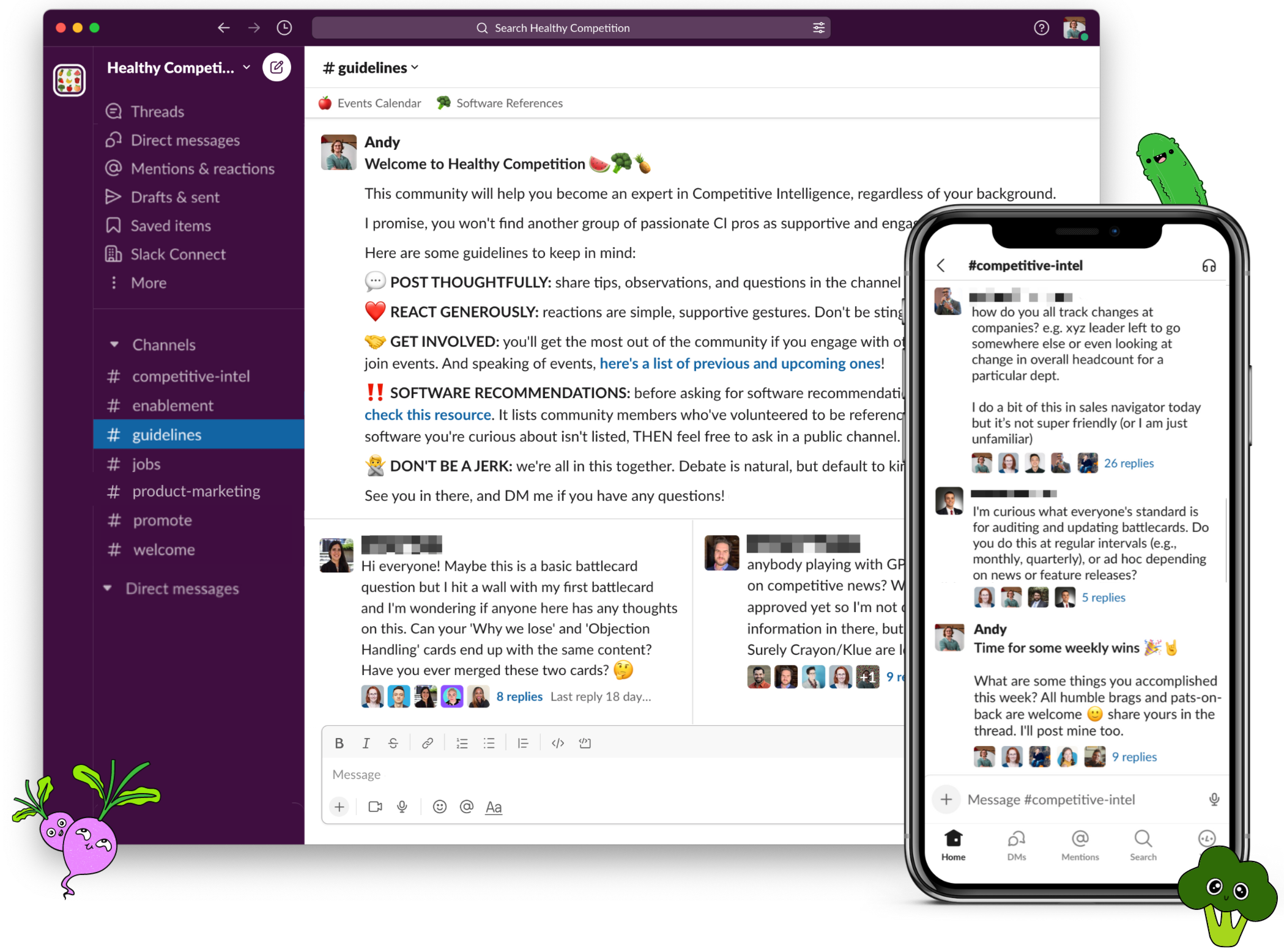
Competitive Intel and Product Marketing practitioners at leading companies have joined Healthy Competition

Why join?

Let's be honest...
Competitive Intelligence is a niche job function with limited resources to help us succeed.
Networking is hard; most of us could not name more than a couple of Competitive Intel practitioners to bounce ideas off of.
The sensitivity of Competitive Intel makes it uncomfortable to ask questions publicly on social media.
Healthy Competition solves these things
Get answers to your questions in minutes from verified Competitive Intel practitioners with a range of backgrounds.
Join monthly events to connect one-on-one with other Competitive Intel folks and grow your network.
Learn what others are thinking about, join in on discussions, and search for topics that are relevant to you.
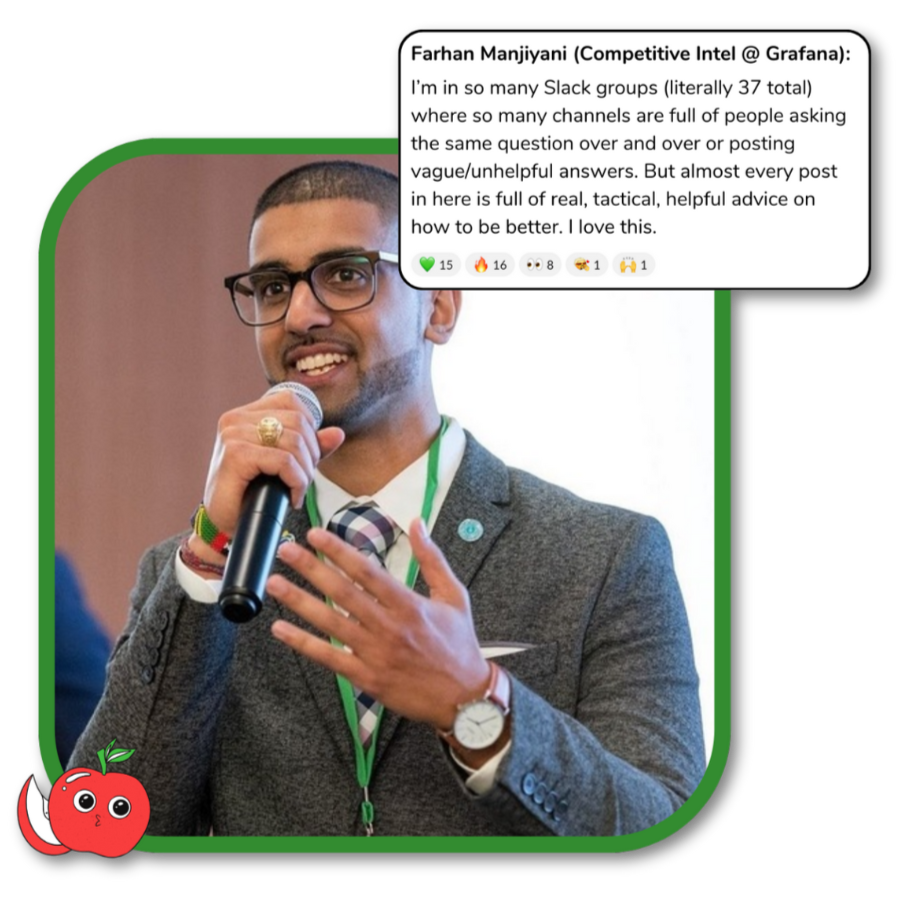
The #1 resource for Competitive Intelligence practitioners
Tactical advice to build Competitive Intelligence programs.
Monthly community events to learn from others' experiences.
Dozens of references you can message before spending $ on software.
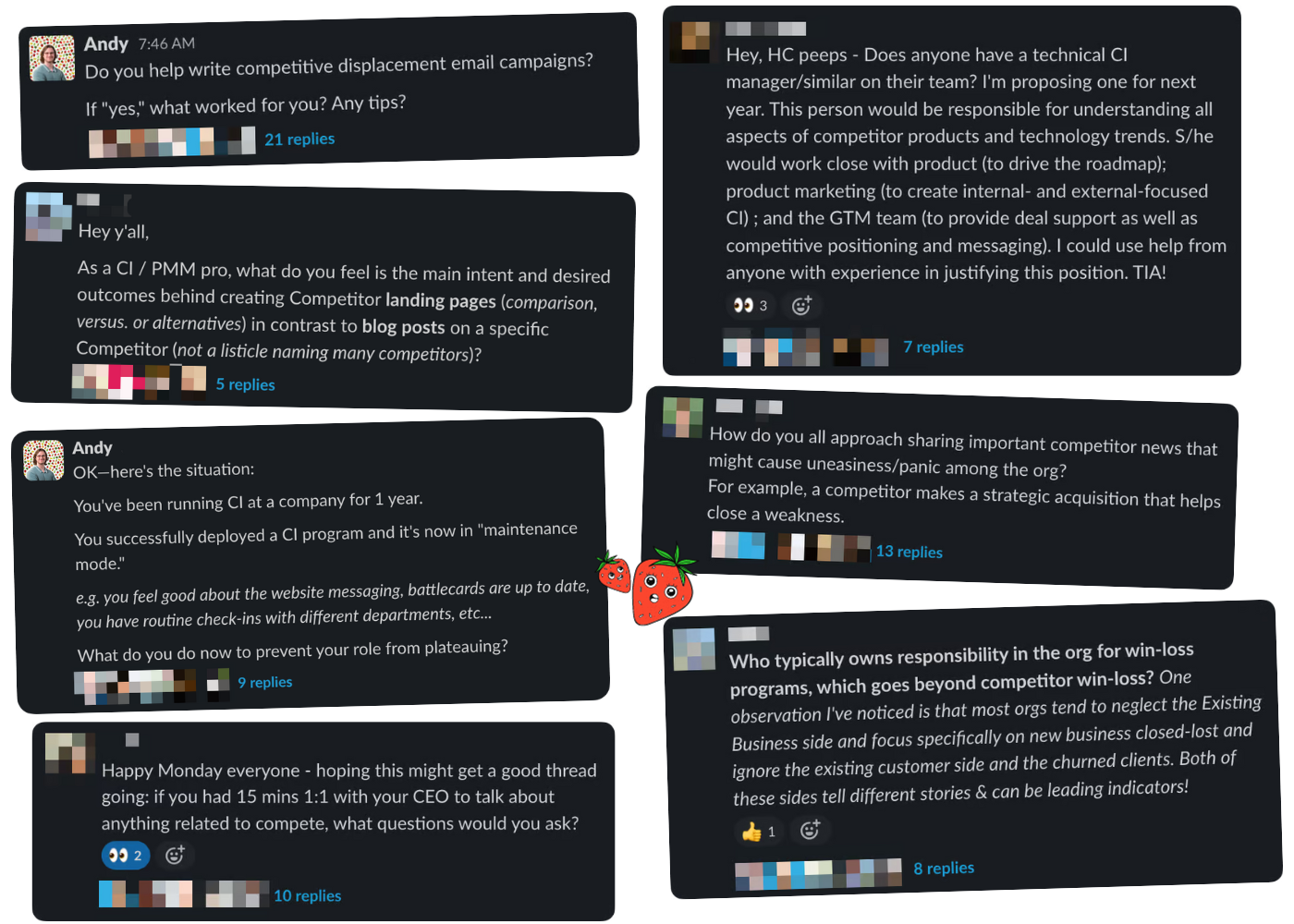
It's not a large community
And that's on purpose.Keeping things on the smaller side helps members create genuine connections with each other.That looks like 100+ members exchanging an average of 1,000+ messages every month.This doesn't mean we aren't growing. We just do it slowly.Unlike other communities, we have no goals or OKRs tied to member count growth.Instead, we prioritize high-quality discussion and connection.
One last thing
Many employers will reimburse professional community fees. Here's a template to help you make the ask.
Not ready to join yet?
All good! In the meantime, join our free newsletter to get weekly tips delivered right to your inbox. We'll also throw in a salary report, our swipe file, and recommended software to check out.
© 2024 Healthy Competition. All rights reserved.
Thanks! You're on the list.
I'll send you a note on Aug. 28th at 8am PST when the offer is live.
I'm limiting this offer to 10 people, so act fast when you get the email!
Competitive Snacks
Get inspired for your next competitive play.
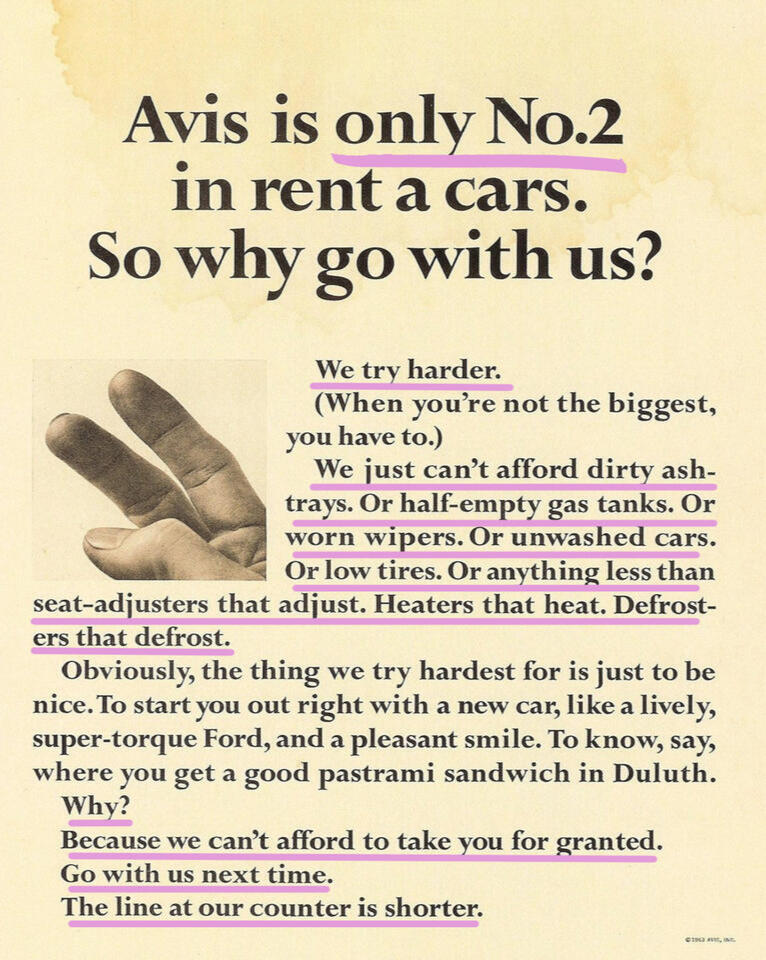
Avis's "We Try Harder" Campaign
Avis is a rental car company that was founded in 1946. In the 1960s, the company launched its "We Try Harder" campaign, which was designed to differentiate Avis from its main competitor, Hertz, which was the market leader at the time. The campaign focused on the idea that Avis was a scrappy, customer-focused company that was willing to go the extra mile to satisfy its customers, while Hertz was more focused on being the biggest and most successful rental car company.The "We Try Harder" campaign was launched in 1962 and was initially created by the advertising agency D'Arcy Masius Benton & Bowles. It featured a series of advertisements that highlighted the fact that Avis was the "Number 2" rental car company, but that it was trying harder to be the best. The advertisements often featured images of Avis employees going above and beyond to help customers, and the slogan "We Try Harder" became synonymous with the Avis brand.The "We Try Harder" campaign was hugely successful and became one of the most iconic advertising campaigns in history. It helped to establish Avis as a major player in the rental car industry and helped the company to gain a significant share of the market. The campaign was so successful that it was eventually adopted by Avis operations in other countries around the world.
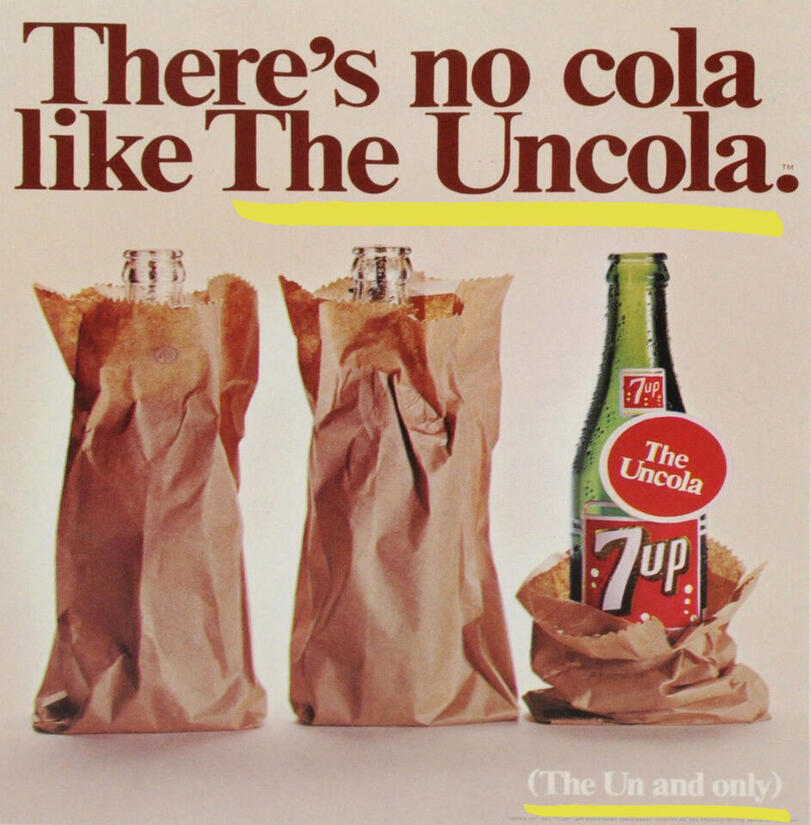
7-Up's "Uncola" Campaign
7Up is a brand of lemon-lime flavored soda that has been around since the 1930s. In the late 1960s and early 1970s, the brand launched a marketing campaign called "The Uncola" that was designed to differentiate 7Up from its main competitors, which were primarily cola brands such as Coca-Cola and Pepsi.The "Uncola" campaign was created by the advertising agency Needham, Harper & Steers and was launched in 1967. It featured a series of advertisements that emphasized the fact that 7Up was different from other cola brands and that it had a unique, refreshing taste that set it apart. The advertisements often used slogans such as "The Uncola" and "7Up, the Uncola," and they featured images of people enjoying 7Up in various settings, such as at a beach or in the park.The "Uncola" campaign was hugely successful and helped to establish 7Up as a major player in the non-alcoholic beverage industry. It also helped the brand to gain a significant share of the market, and 7Up remains a popular choice for consumers today. The "Uncola" campaign has been credited with helping to change the way that consumers think about non-alcoholic beverages and has been referenced by other brands as a successful example of differentiation in advertising.
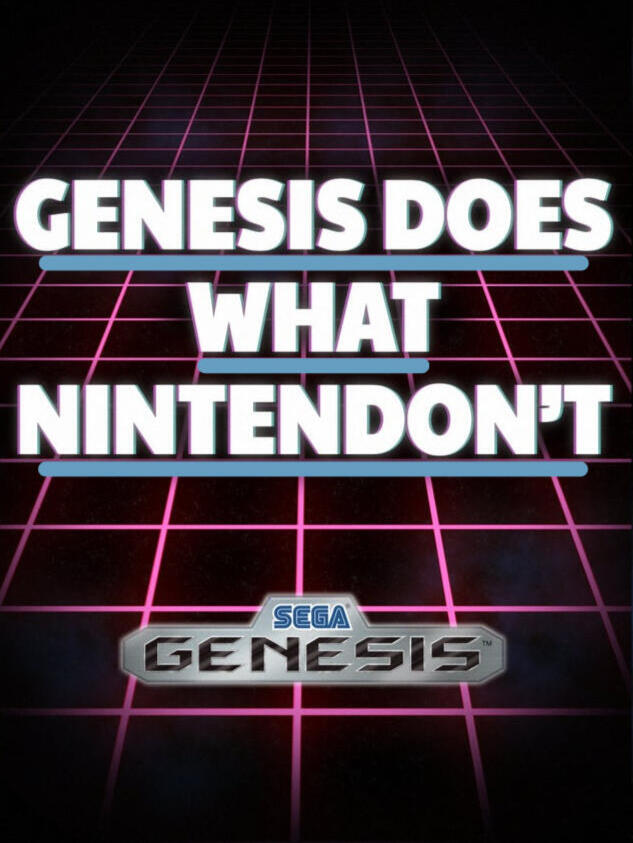
Sega vs. Nintendo: Console Wars
The Sega Genesis was a home video game console released by Sega in 1988. It was the first console in the Sega Genesis series and was designed to compete with the popular Nintendo Entertainment System (NES), which had dominated the home video game market in the 1980s.The Sega Genesis was known for its advanced graphics and sound capabilities, as well as its support for a wide range of game genres. It also featured a number of popular exclusive games, such as Sonic the Hedgehog, which became a major mascot for the console.Despite its success, the Sega Genesis struggled to compete with the NES in terms of market share and overall sales. However, it was able to establish itself as a strong competitor in the home video game market and helped to pave the way for future Sega consoles, such as the Sega Saturn and the Dreamcast.The rivalry between Sega and Nintendo in the home video game market continued throughout the 1990s and into the 2000s, with both companies releasing a number of successful consoles and games.
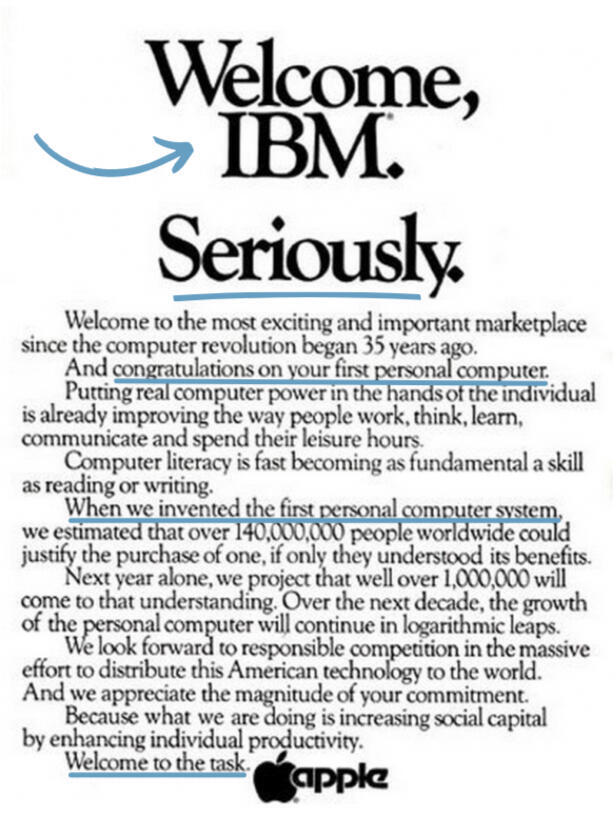
Apple's Wall Street Journal Ad
In the early 1980s, IBM announced its entry in the personal computer market. In response to this announcement, Apple placed a full-page ad in The Wall Street Journal welcoming them to the market.The ad, which was titled "Welcome, IBM. Seriously," began by welcoming IBM to the personal computer market and acknowledging the company's leadership and experience in the industry.The ad was widely seen as a bold move by Apple, which was a much smaller company than IBM at the time. It helped to establish Apple as a leader in the personal computer industry and contributed to the company's reputation as a forward-thinking and innovative brand. The ad also helped to fuel the ongoing rivalry between Apple and IBM in the personal computer market, which has continued to this day.
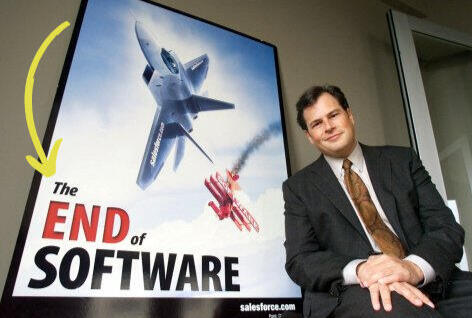
Salesforce's "End of Software" campaign
Salesforce is a customer relationship management (CRM) platform that provides a range of tools and services for businesses to manage their customer interactions and data. The company has a strong focus on cloud-based solutions, and many of its products and services are delivered via the cloud rather than through traditional software installations.Their "End of Software" campaign was launched in 1999, when Salesforce was first introduced. The campaign was aimed at promoting the benefits of Salesforce's cloud-based CRM solution over traditional on-premises software installations.The campaign featured a series of print advertisements, which depicted images of physical software boxes being crushed or otherwise destroyed, with the tagline "The End of Software."While cloud-based solutions like those offered by Salesforce have become increasingly popular in recent years, traditional software installations are still used by many businesses and organizations for a variety of purposes.

Citroen used humor to their advantage
The Citroen 2CV was a small, inexpensive car that was produced by the French automaker Citroen from 1948 to 1990. It was designed to be a simple, reliable, and affordable transportation option for people who needed a basic car for everyday use. As such, it was not intended to compete with high-performance sports cars or luxury vehicles like Ferrari, Rolls-Royce, or Porsche.While the 2CV was not designed to compete with these brands directly, it found success advertising against them in a tongue-in-cheek manner. It found a niche in the automotive market and became a popular choice for people who needed a basic, reliable car for daily use. It was known for its simple, utilitarian design and low cost of ownership, and it gained a loyal following among consumers who appreciated its no-frills approach to transportation.Overall, the Citroen 2CV was a successful car that helped to establish Citroen as a major player in the automotive industry.
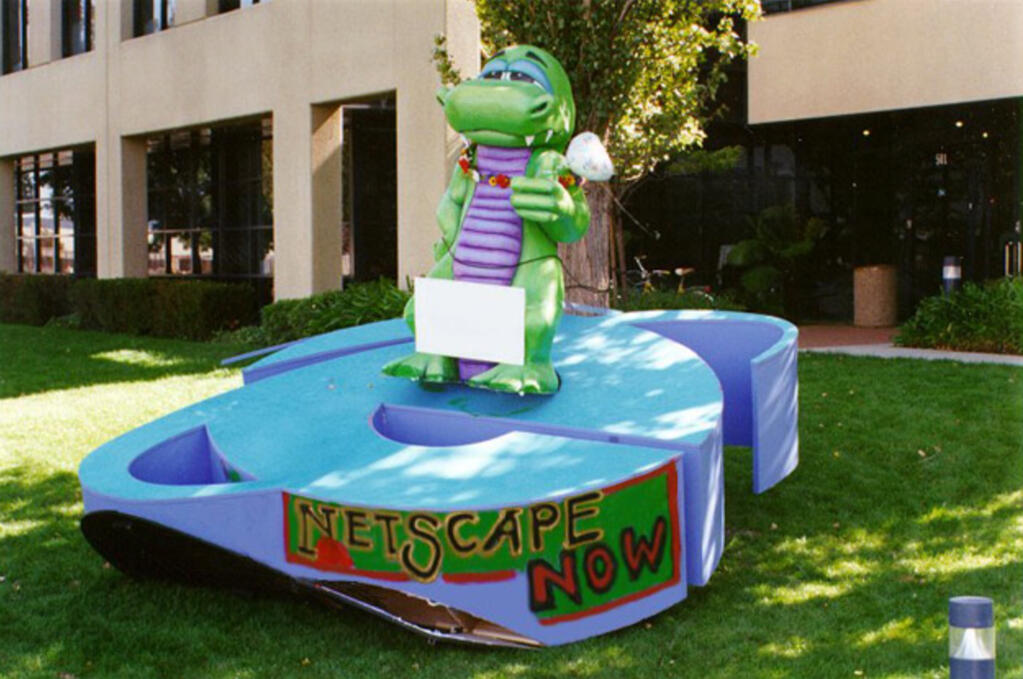
Netscape vs. Microsoft: Browser Wars
The browser wars were a period of intense competition in the late 1990s and early 2000s between Netscape and Microsoft, two companies that developed web browsers for accessing the internet. The competition began in 1994 when Netscape released the first version of its Navigator browser, which quickly gained a dominant market share. Microsoft responded by developing its own browser, Internet Explorer, which it bundled with its Windows operating system.The rivalry was intense and included instances of both companies attempting to one-up each other. One such instance occurred when the Microsoft browser team dropped off a large Internet Explorer (IE) logo at the campus of Netscape on the night that Internet Explorer 4 was launched. The Netscape team was offended by the gesture and toppled the IE logo, replacing it with their own Mozilla dragon mascot and holding a sign that read "Netscape 72 Microsoft 18," implying that Netscape was the superior company.Netscape was eventually acquired by AOL in 1999, and its browser technology was used to develop the Mozilla Firefox browser, which continues to be a popular choice today.
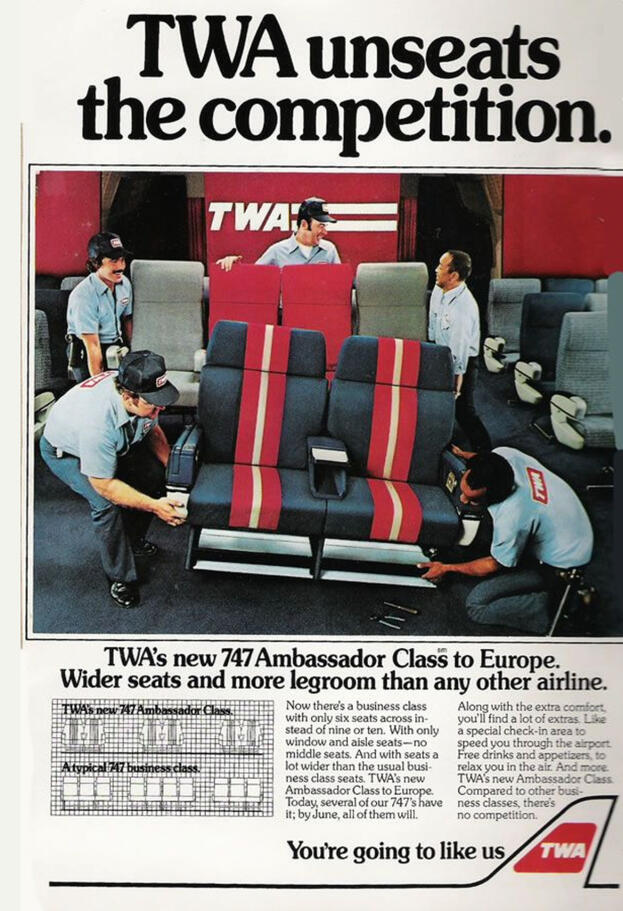
TWA vs. other airlines
Trans World Airlines (TWA) was an American airline that operated from 1930 until 2001. It was a major player in the airline industry and operated flights to destinations around the world.In the 1980s, TWA was facing increasing competition from other airlines, both domestic and international, and struggled to maintain its market share. Despite these challenges, TWA continued to operate flights to a variety of destinations, including popular vacation destinations in Europe and the Caribbean.It was acquired by American Airlines in 2001.
Inspired yet?
Here are some other resources you might like 👇
Community
Connect with go-to-market pros in the Healthy Competition Community to learn how to help your company differentiate and beat competitors.
Newsletter
Get free tips, trends, interviews, and community updates delivered to your inbox every week.
© 2022 Healthy Competition. All rights reserved.
Competitive Snacks
Get inspired for your next competitive play.
FYI: These are in no particular order.
Also, we don't have data that shows the results of these campaigns. That's okay though, they still made us smile.
Salesforce takes a swipe at Meta, Amazon, and Tesla with their "New Frontier" commercial

Inspired yet?
Here are some other resources you might like 👇
Community
Connect with go-to-market pros in the Healthy Competition Community to learn how to help your company differentiate and beat competitors.
Newsletter
Get free tips, trends, interviews, and community updates delivered to your inbox every week.
© 2022 Healthy Competition. All rights reserved.
Sorry to see you go!
No hard feelings though. Just enter your subscription email in the form and we'll cancel your membership.
© 2022 Healthy Competition. All rights reserved.

















